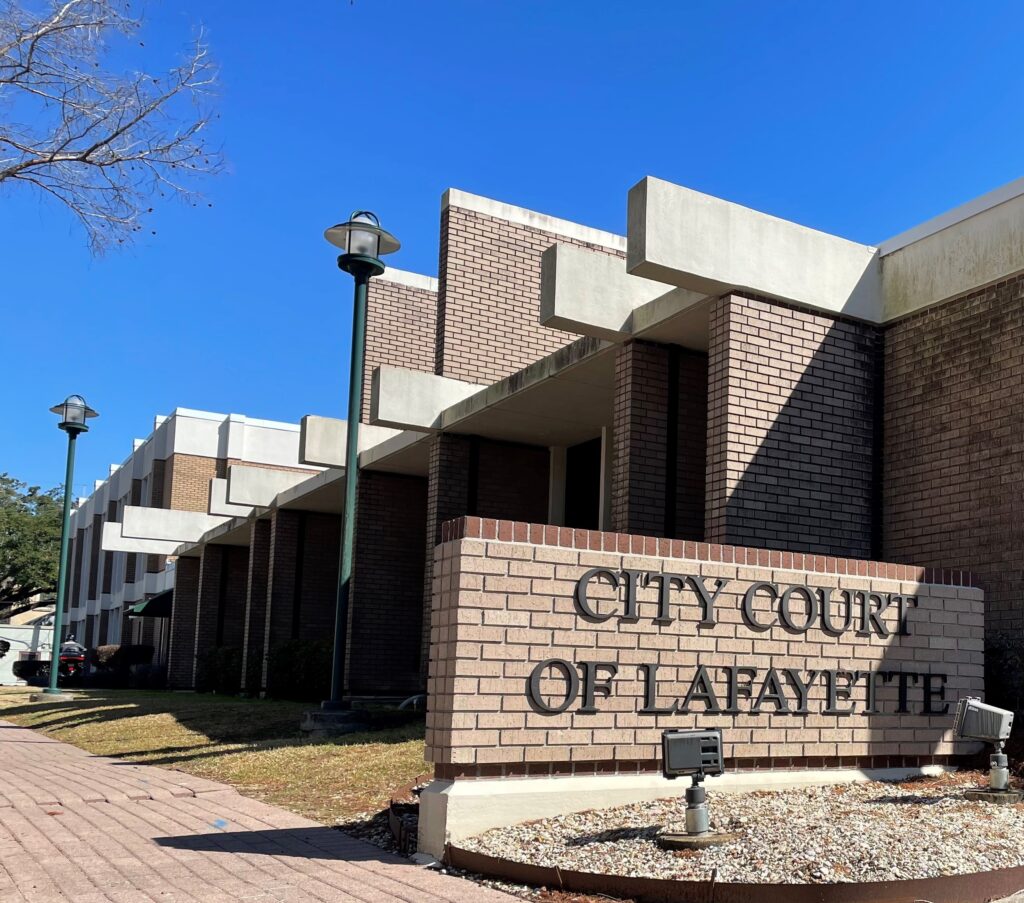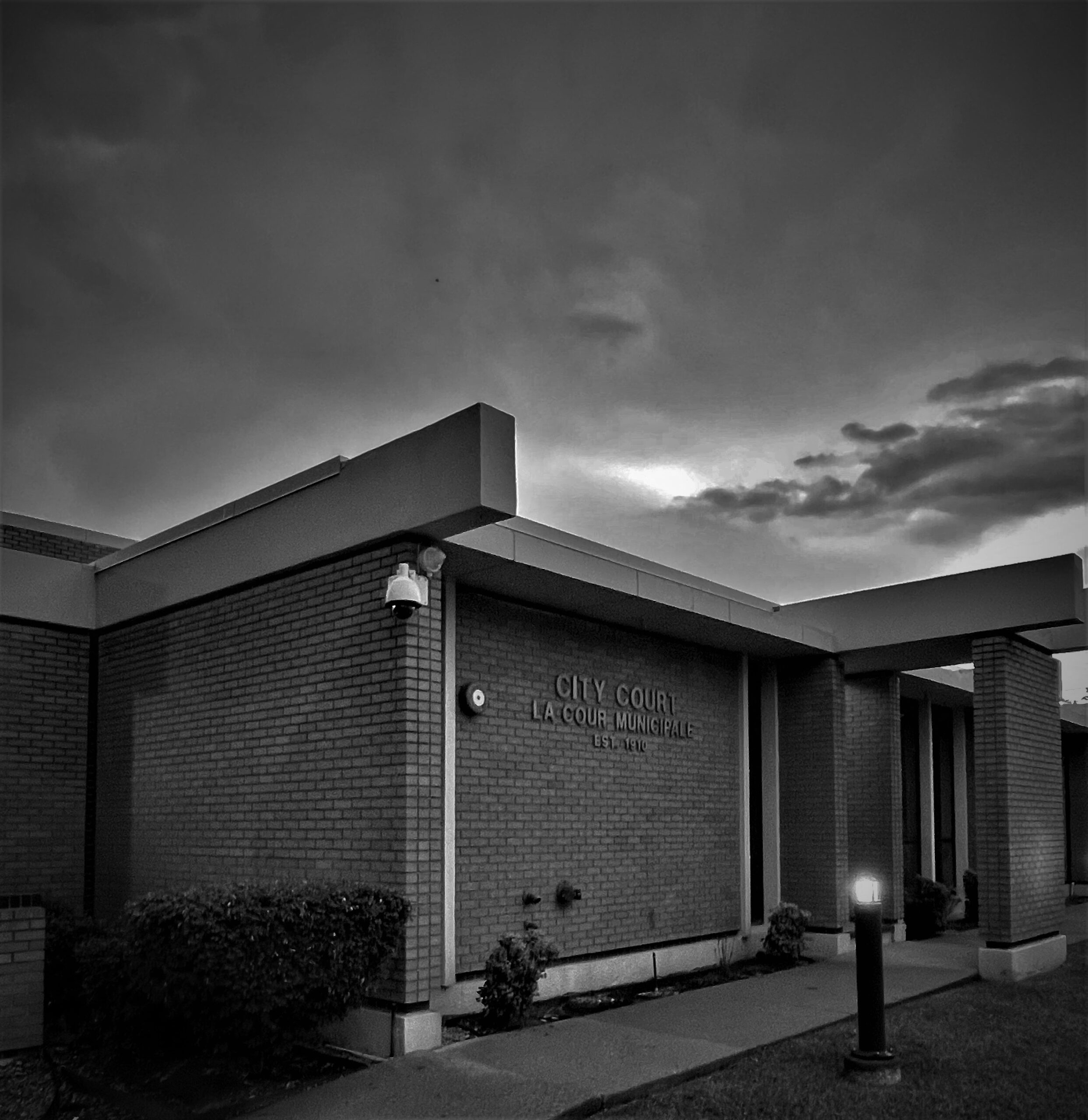WILL LAFAYETTE FIND TRUE JUSTICE WITH NEW JUDGE?
When sunglasses come off revealing a black eye, questions arise: was there an accident? a mugging? an abusive relationship? Judge Michelle Odinet’s recorded use of racial slurs knocked Lafayette’s sunglasses off for the world this past December. From Saturday Night Live to the BBC, the world heard a Lafayette elected official refer to a black man with the N-word and as a “roach”. The resulting shiner and public outcry led to Odinet’s apology and resignation. A special election takes place on November 8, 2022, to fill her remaining term. The candidates vying to replace Odinet are Jules Edwards, Roya Boustany, and Toby Aguillard. Lafayette’s black eye reveal raises issues whose solutions may determine how justice will be administered in the city.
PRELUDE TO THE PUNCH
Odinet’s victory in 2020 appears to have been business as usual for Lafayette. She ran as a white, well-connected Republican whose physician husband is also the Parish coroner. A review of the Louisiana Ethics Administration Program website shows that she raised $145,244.00 from supporters who represent a who’s who of Lafayette realtors, lawyers, doctors, and businessmen. On the other hand, her opponent Edwards was at that time a 63-year-old, 28-year tenured district court judge, retired Army colonel and black man who ran with no-party affiliation. He raised $49,977.33, or roughly 1/3 of that donated to Mrs. Odinet. Given the disparity in fundraising and high Republican turnout for the Trump presidential bid, her large margin of victory of 57% to 43% did not surprise the casual observer. The numbers reinforced, at least in part, Lafayette’s recent history of voting heavily for Republicans.
Edwards and his supporters, however, still found it difficult to accept that voters overlooked one number that they contend should have determined the election. Edwards’s 28 years as a sitting judge, not including his years in practice, clearly gave him more legal and judicial experience than Odinet, who, in contrast, had only practiced law for a short period after getting her law degree in 1993. She returned to practice years later as a Lafayette Parish Public Defender in 2019 shortly before running for City Court. Given his non-party affiliation since his 1998 term, Edwards’s supporters were confident that his judicial experience would override Odinet’s lighter resume’ and party affiliation. Nevertheless, while no one could have anticipated the video scandal, 32,104 of Lafayette’s voters chose her for reasons many believe were other than legal experience.
A VIEW OF CITY COURT
City Court is Lafayette’s closest version to television’s Judge Judy. A typical day involves one of the two City Court judges presiding over a full courtroom with dozens of unrepresented people. City Court judges decide civil disputes up to $20,000 along with DWIs, traffic tickets, evictions, juvenile matters, debt collections, and misdemeanors.
On busy days, when its wooden pews are full of litigants, a high level of judicial wisdom, compassion, patience and common sense is required to meet Lafayette’s growing need for justice at the street-level.
While the dollar amounts in dispute in City Court are limited, its annual budget for 2022 is a sizable $3,057,068. The winner of November’s election will be an administrator of the court’s operations and over 30 employees. They will also preside over a heavy docket of hundreds of cases.
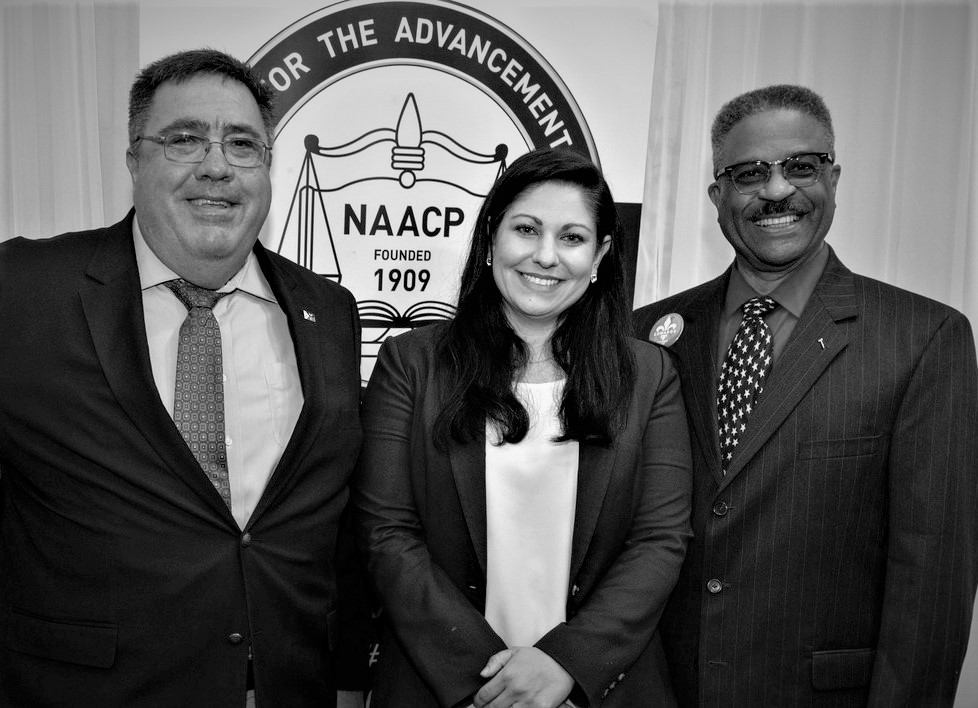
Lafayette voters get to take another look into the next City Court judge’s qualifications. The three candidates, by reputation, are generally considered to be sincere and good people who want to serve Lafayette. Their track record as public servants and charitable service is established. The winner will serve the remainder of Odinet’s original six-year term. Edwards will be eligible to serve a second term through 2032 since a second-term election would occur before his 70th birthday, the cutoff for a judge running under Louisiana law. Boustany and Aguillard face no such term limits in the immediate future.

Jules Edwards kicked his campaign off first back on January 12, 2022. At the Cajun Dome’s Table Room, he declared his campaign theme again to be, “Qualifications and experience matter.” With American and Louisiana flags in the background, Edwards addressed a crowd representing a diverse cross-section of Lafayette. He spoke of his transition from district court to the jurisdictionally lower city court to be an “upstream” opportunity to help solve Lafayette’s disputes and crimes closer to their source, “civilly, calmly and peacefully.”
As City Court Judge, Edwards said his judicial experience would allow him to get first-time offenders off “of the road to perdition and onto the road of salvation and success.” He said his candidacy was his answer to the call from a Lafayette that is “thirsting for healing.” Punctuating with both hands extended forward, Edwards continued, “I have read in the press recently that this may be a time of redemption. I have heard many ministers say that this is a time for reconciliation. Whether it is redemption, whether it is reconciliation, I am willing to step up to offer myself, my experience and my qualifications to serve Lafayette and help heal this community.”

Roya Boustany, a Republican, held her initial campaign event at Downtown’s Grousse Room, on February 10, 2022. She is a lifelong resident of Lafayette, a seasoned felony level Lafayette prosecutor, a wife, and a mother of three young children. Former Congressman Charles Boustany, a relative by marriage, introduced her to an enthusiastic and crowded room of young professionals, Junior League members, lawyers, family, and friends.
Boustany, expressly staying close to her written comments, made a special point to thank local law enforcement saying, “I respect what they do so very much, they are some of the kindest and most genuine people that I have ever met.”
Boustany then touted her “thousands of hours” of volunteer service. With added emphasis on “I” and “really”, she stated, “ I have been in our community, I mean really in our community not just because I’ve held a position as a public servant, that has never been enough for me.” Continuing with her theme of volunteerism, she said, “I truly believe that volunteering is the ultimate exercise in service to our democracy.”
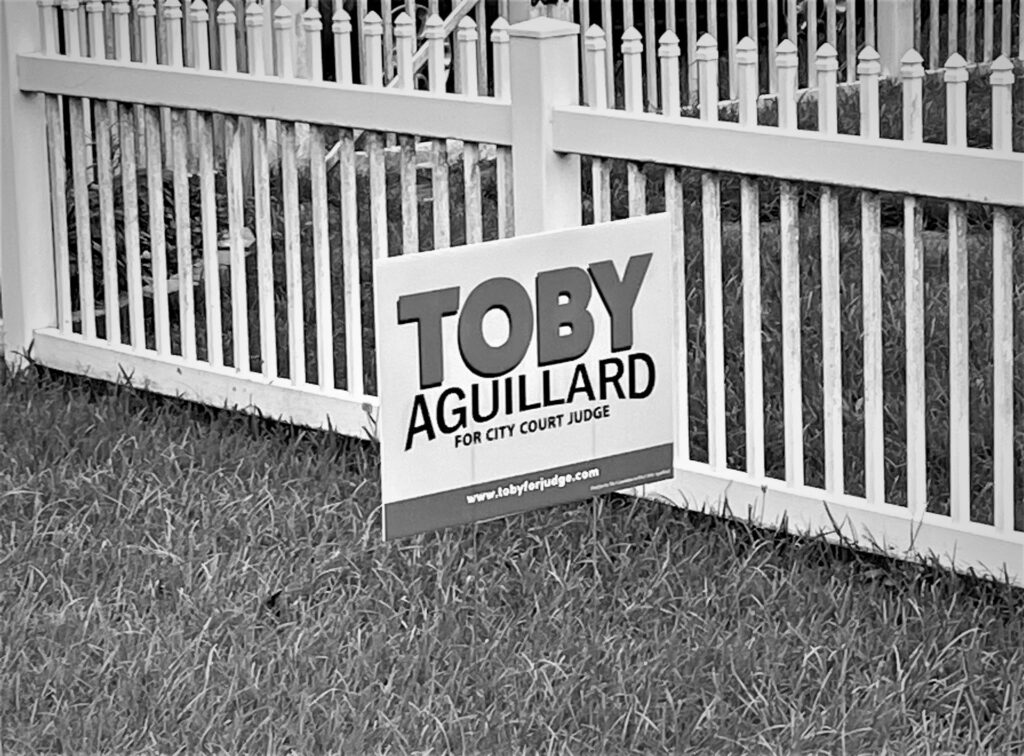
Toby Aguillard announced his candidacy on April 12, 2022, at an event held at Deano’s Pizza on Bertrand Drive. Aguillard’s legal background includes a degree from Southern University Law Center along with service in the Cameron Parish District Attorney’s Office and with the Louisiana Attorney General. He is also a registered Republican.
Former Mayor-President Joel Robideaux is in Aguillard’s corner as campaign chairman. Their connection includes Aguillard’s service as Lafayette’s police chief during the Robideaux administration from 2017 to 2020. A relative newcomer to Lafayette, Aguillard stated that his campaign’s specific goals include strategies to prevent repeat offenders, creation of a veteran’s court, and to establish a litter court. Aguillard currently has a civil practice with the Gaar Law Firm in Lafayette.
Over the months since their respective announcements, campaign and yard signs now dot the roads from Congress Street to Kaliste Saloom Road and throughout the neighborhoods in between. Each campaign has canvassed neighborhoods and hosted a variety of fundraisers in homes and public venues. The Louisiana Ethics Administration Program website shows as of September 29, 2022, Boustany leading in fund raising with $152,613.99, Edwards with $99,372.60, followed by Aguillard’s $31,835.00.
Recent candidate forums sponsored by the Kiwanis and the NAACP have offered voters an opportunity to hear and see each candidate up close. As the race enters the home stretch, the candidates continue making public appearances at events from festivals to football games while pushing commercials on television and Facebook.
From a political standpoint, the issue of legal experience will again be a matter of perception. Voters looking at judicial qualifications ultimately will decide whether to choose either Boustany or Aguillard’s potential to be a judge versus Edwards’s past experience as a judge. To that end, Aguillard cites his ability to listen and familiarity with the community’s needs gained while police chief as a possible separator from his competition. The Boustany campaign has similarly emphasized qualities such as energy, volunteer service, along with her recent trial experience. While Boustany’s and Aguillard’s judicial experience is undeniably less than that of Edwards, their more recent experience as practitioners may appeal to some voters particularly other attorneys. For his part, Edwards, has enjoyed a reputation of being a hard-working judge whose temperament allows parties to be heard and have their day in court.
Both Republican campaigns’ emphasis on intangibles over past judicial experience represents, at least in perception, a departure from Goldwater era philosophy which promoted measurable qualifications over quotas and subjective criteria. Whether Lafayette’s Republicans will again choose party affiliation, intangibles and potential over past judicial experience remains to be seen. If so, which of the two Republican candidates will emerge as their choice may come down to intraparty politics and who can get out the vote. Signs of the former already may include the Lafayette Parish Republican Party’s reported endorsement of Aguillard.
On the other hand, any Democrats alleging ethnicity factored in Edwards’s loss in 2020 may have difficulty logically throwing rocks. Democrat President Biden’s fulfillment of a campaign pledge to nominate Kentanji Jackson to the Supreme Court based, at least in part, upon her ethnicity leaves little room in that glass house.
Incidentally, House Bill No. 206 which attempts to depoliticize the judiciary by eliminating the candidates’ party affiliation from the ballot in judicial elections recently passed through committee on April 6, 2022, and awaits calendaring for a vote before the full Louisiana House. Opponents of the bill believe party affiliation communicates in short hand a candidate’s general positions and how they will likely perform on the bench. While there may be some truth to this, the bill’s proponents challenge whether party affiliation should ever play any role in judicial matters including elections.
A VISION OF JUSTICE
In addition to partisan interests, reasons for voting for judges can range from social or group ties to self-interest such as the hope for leniency when getting a traffic ticket. For the Christian voter, Pastor Brandon Nealy of Christ Church of Lafayette, a scholar on Reformational theology and government, suggests a higher standard. He dismisses the idea that socioeconomic ties, ethnicity, or the receipt of judicial favors are biblically relevant qualifications for Christians in selecting judges.
Instead, Nealy suggests that Christians consider Exodus 18:19-21 where the qualifications for selecting judges include those who fear God, who can represent the people before God, who can inform the people of the law and their obligations, and who are “trustworthy” and “hate a bribe.” Nealy notes, “Christ longs to bless us with a just society. The bible is full of verses establishing men’s qualifications for office. These include maturity, wisdom, fairness, and faithfulness in serving Jesus as they serve their community.”
Lafayette attorney Corey Grimley, a parishioner at Our Lady of Wisdom, draws upon John Paul II’s teachings for understanding the role of courts. Grimley notes, “St. John Paul II saw the connection between judges administering justice and peace in a community. Speaking to an audience of judges, he taught that “man”, as a creature of God, possesses dignity and inalienable rights that even when found guilty should not be punished in a manner that attacks man’s dignity or hope of redemption.”
Grimley sees John Paul II as being very concerned about the need for an independent judiciary. “St. John Paul II taught that sin causes groups who, out of self-interest, attack the inalienable and property rights of individuals in disregard for the common good. A City Court judge must resist this and be independent of such influences,” said Grimley.
Along with a judge’s qualifications, both men believe justice suffers if grounded upon nonbiblical and subjective foundations. Competing theories of justice based upon identity and economic interests rather than objective biblical principles of justice are gaining proponents. Biblically objective standards, on the other hand, offer Christians guidance for electing judges and for strengthening a judicial system that is increasingly vulnerable to subjective and outcome-based pressures.
Nealy explains, “What makes a society just? Our current competing factions push the extremes of radical individual autonomy on one hand and centralized government authority on the other. For example, in economics, some believe a just society comes from an economy founded upon the invisible hand of Adam Smith’s free markets. Others are concerned that the invisible hand is not so invisible and is in fact a straight, white, male hand which consequently requires government and judicial control and
intervention.”
Nealy suggests an alternative for Lafayette, “This is where Christians should be offering an alternate solution- an alternate society based upon the word of God. Rather than letting the markets and the policies of our city be governed by central planning or Smith’s invisible hand, justice will come when we realign our laws and our courts with the decrees of King Jesus as revealed in scripture.”
Grimley offers a similar approach to justice based upon Christian teaching. “Everything we do must point to God in guiding our community to eternal beatitude with Him. We are here to know, love and serve God and to love our neighbor as ourselves.” Grimley continues, “Accordingly, all of our laws, and the application of those laws by our judges, must be anchored in God’s revelation regarding justice, particularly as expressed in Sacred Scripture. Justice must be based on objective, transcendent truth and not on the desires and inclinations of man.”

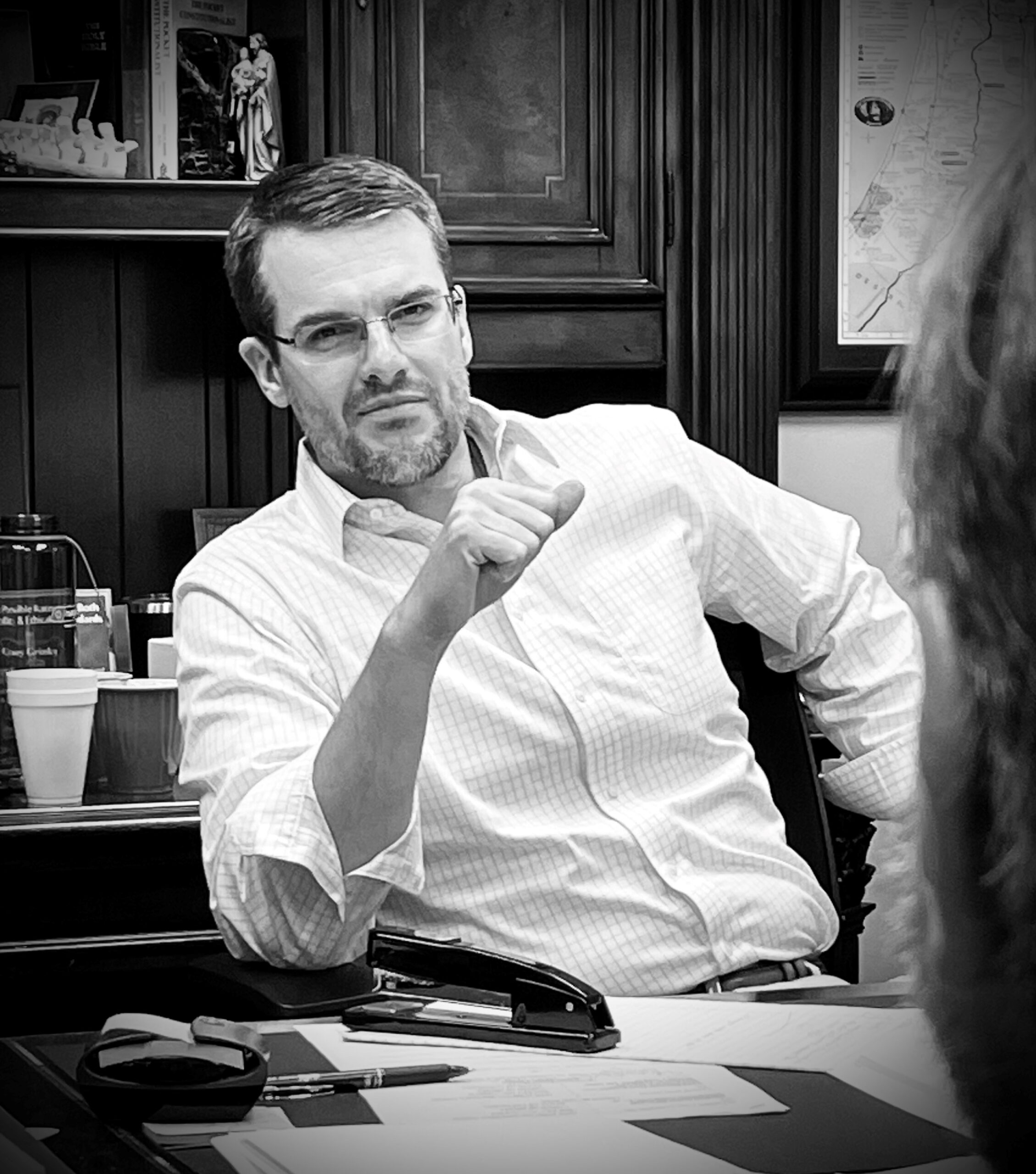
Both Nealy and Grimley present an orthodox Christian apologetic of true justice. While such may seem out of step in a secular age, both reflect the Declaration of Independence’s affirmation of “self-evident” truths of “unalienable rights” “endowed” to man by his “Creator” with the purpose of government and its courts being to “secure these rights” by the “consent of the governed.” In contrast to the modern distortions of justice, both men support a return to the nation’s foundational principles of justice.
For the secularists and nonreligious who reject the foundations of justice found in scripture and the Declaration of Independence, each nevertheless must borrow from transcendent and objective values in order to declare anything “good” or “evil”. For example, many see murder as being evil in most cases and, therefore, agree it should be illegal and prosecuted. But upon what basis and standard can the nonreligious make such value assertions? While refusing to admit the divine origin of such value judgments, absent the transcendent and objective standards revealed in scripture and by Nature’s God, secularists offer no real or enduring basis for justice. Without a shared overarching objective standard of authority, justice devolves into power politics. Will Lafayette’s Christian voters, much less its secular voters, set aside partisan or self-interest to cast ballots in favor of the candidate they determine to be the most capable of administering true justice? Perhaps. For now, though, the Church in Lafayette still has rebuilding to do in this area.
A GLIMPSE TO THE FUTURE
Lafayette prides itself in being a fun-loving welcoming city of festivals. Its joie de vivre reputation, however, took recent hits nationally with the Pellerin shooting protests, looting at Citi Trends, and the Odinet scandal. If 2020’s nationwide protests, riots and turmoil taught nothing else, isolated, accumulated or even fabricated injustices create tinderboxes upon which communities can be set ablaze.
It is a truism that tilting the scales of justice one’s way emboldens one’s opponent to do the same. Any favoritism from the next City Court judge toward whites or blacks, plaintiffs or defendants, the police or the accused undermines the rule of law and harms Lafayette as a whole. The resulting cycles of injustice could destroy Lafayette’s peace and affirm Proverb 22:8’s teaching, “whoever sows injustice will reap calamity.”
For example, in Lafayette’s recent past, evidence existed that the city’s risk manager, city prosecutor, and police coordinated the prosecution of charges such as “remaining after forbidden” against arrestees claiming the police used excessive force. (See Amos v. Lafayette Parish Consolidated Government, et al. CV 04-0968, W.D.LA) Lafayette’s next City Court judge must be capable of adjudicating each case fairly, on its individual merits and be able to discern sham from real charges. Each of the three candidates have pledged to do so in all cases from misdemeanors to evictions.
The lessons from the past two years also highlight the impact going forward that Lafayette’s law enforcement, including its courts, will have on neighborhoods and businesses throughout Lafayette, both north and south. The City’s recent, and some say under-reported, crime rates will also require local courts to wisely administer limited judicial resources. Can this be done while still deterring bad behavior yet without violating the individual rights of victims or the accused? Lafayette’s safety and welfare will depend upon the winner’s ability to do so. A Lafayette City Court and a police force that ignore biblical and church teaching connecting fairness and justice to street level peace do so to Lafayette’s detriment.
Lafayette can take a punch. From oil busts to seasonal hurricanes, Lafayette has taken and come back from past haymakers. The latest black eye, though, feels different and in some ways self-inflicted by someone of and elected by Lafayette. The gospel opportunities for justice, healing, a restoration of faith in the City Court, and even reconciliation and forgiveness between all of the community, including Odinet, all lie ahead of Lafayette. Whoever prevails can be an important part of ushering in a new day and lifting the cloud hanging over City Court. Each candidate expresses this hope. Otherwise, if not, Lafayette may look back at this election as having simply added makeup to the swelling.
